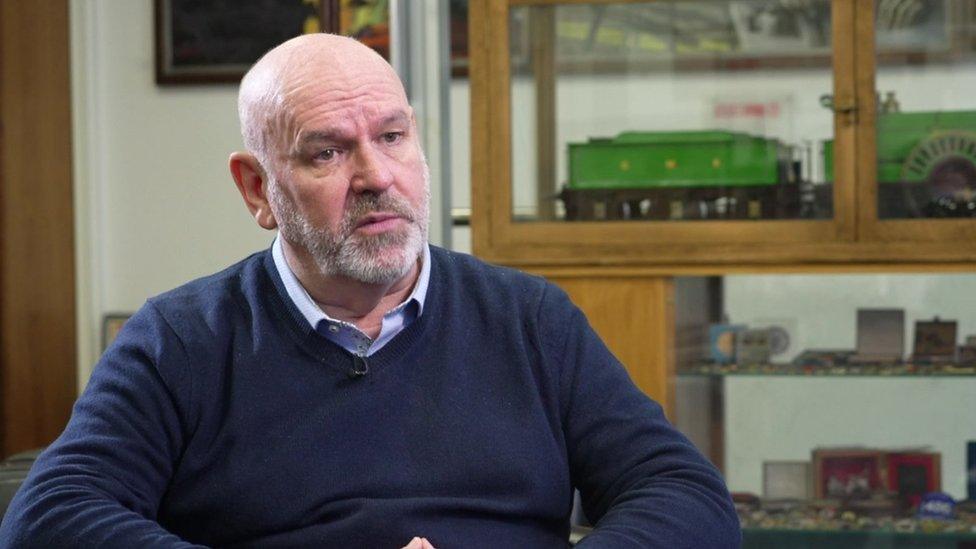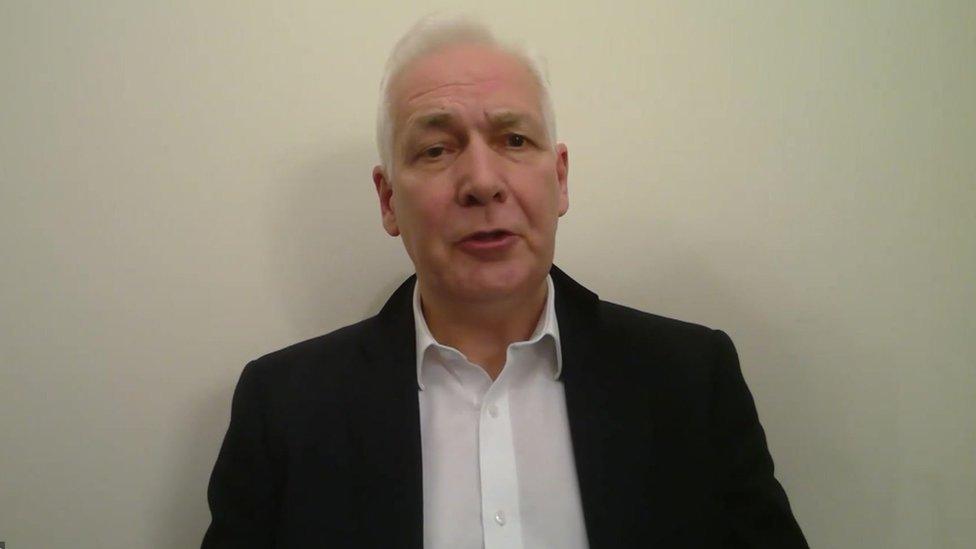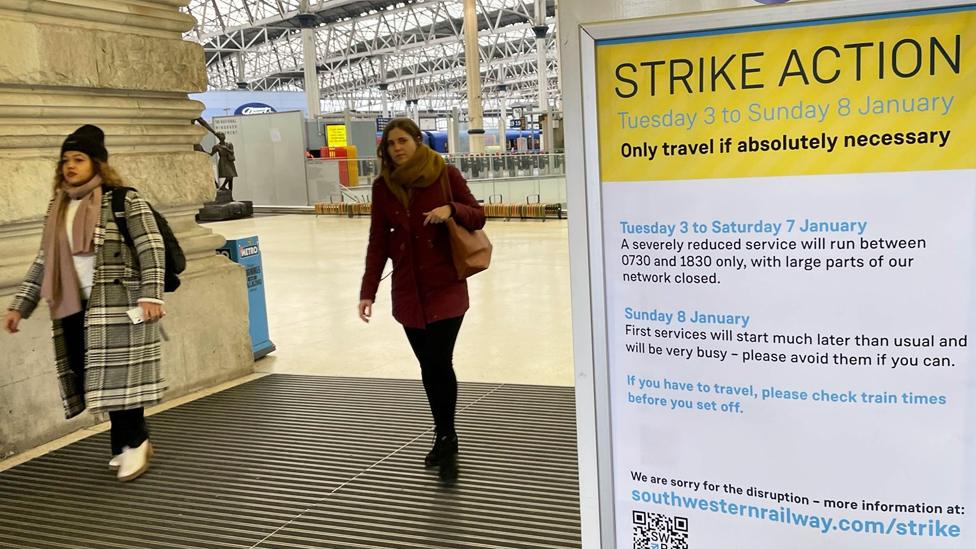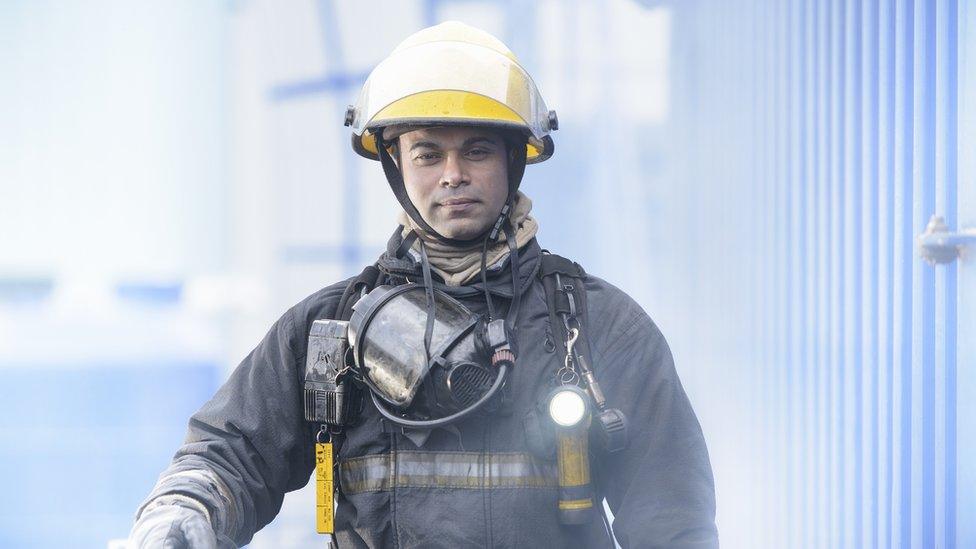Train drivers' union warns strikes could escalate
- Published
- comments

Mick Whelan told the BBC his union now had a stronger mandate than before.
Train drivers may intensify their campaign of industrial action as they seek a breakthrough in an ongoing dispute over pay, their union leader has said.
Drivers at 15 train companies are walking out on Thursday, leaving some operators unable to run any trains.
Mick Whelan told the BBC that Aslef now had a stronger mandate than before.
Frustrated members of the union had told him was currently "not going hard and fast enough", he said.
A wave of industrial action is affecting sectors from the health and postal services to driving examinations, as people seek pay rises that keep up with the rising cost of living.
Rail workers in the RMT and other unions have taken part in a series of large scale strikes over more than six months.
Thursday marks the sixth day of action since last summer by members of Aslef, which represents most train drivers with 12,500 drivers at 15 train companies expected to take part.
"It may be we have to take greater action going forward, to make people listen," the union boss said.
"There is a vast will among our membership to continue," Mr Whelan added. "We're in this for the long haul."
The Aslef leader said that a pay rise was years overdue.
One report, external suggested Aslef members could be offered a new pay deal worth £2,000 extra per year, but Mr Whelan told the BBC's Today Programme that he hadn't seen any such offer.
He added: "If that turns out to be an offer, and they've leaked it to the press... I think that's self defeating. It breaches the trust and honourability of the negotiations we're in."
Mr Whelan insisted no offer at all has yet been made by the Rail Delivery Group (RDG), the body which represents train companies.
Steve Montgomery, chair of the RDG, said they were getting closer to being able to put forward an offer but added that "sensible and reasonable reform" had to be on the table.
"I think we have done work with Aslef that can get us there," he told the BBC. "But it does mean both sides have got to start having meaningful discussions. So I do think we are closer but there's still further work to be done."
When an offer does materialise, it is expected to be similar to proposals the RMT rejected which involved a 4% pay rise for 2022 and 4% for 2023, conditional on a list of changes.

Rail Delivery Group chair Steve Montgomery is seeking "sensible and reasonable reform" from union members
The two sides are seeking a broad brush agreement that would then have to be agreed at local level with all 15 train companies involved. Mr Whelan said it was possible no agreement would be reached within the next year.
Aslef and the RMT are expected to meet rail employers and the rail minister on Monday to try and find a way forward.
The government and the rail operators said changes are needed to working practices, to modernise the railway and make it more efficient - in order to fund higher pay.
But Mr Whelan said what had been discussed did not, in his view, amount to reforms. "They've spoken to us about a long wish list of productivity-for-nothing," he said.
Mr Montgomery said they were not asking drivers to "do longer hours and receive less pay for it" but "asking people to be more flexible within that 35 hour week".
Asked about the unions' claims that the government was holding back a settlement, Mr Montgomery said there was "restraint" but said "it's because of the fact we are using taxpayers' money at this stage." He added: "We believe we can bring sensible reform that will not cost the taxpayer anything further."
Mr Whelan said that because inflation had "gone through the roof" since Aslef first sought an offer, what was acceptable six months ago "may not be acceptable to our members now".
"We're chasing a pay rise that at least puts a dent in that inflation," he said.
A Department for Transport spokesperson said that both the transport secretary and the rail minister have so far had "polite, constructive" meetings with a range of union leaders.
"Passengers have rightly had enough of rail strikes and want the disruption to end. Unions should step back from strike action so we can start 2023 by ending this damaging dispute."

Have you been affected by the rails strikes? Share your experiences by emailing haveyoursay@bbc.co.uk, external.
Please include a contact number if you are willing to speak to a BBC journalist. You can also get in touch in the following ways:
WhatsApp: +44 7756 165803
Tweet: @BBC_HaveYourSay, external
Please read our terms & conditions and privacy policy
If you are reading this page and can't see the form you will need to visit the mobile version of the BBC website to submit your question or comment or you can email us at HaveYourSay@bbc.co.uk, external. Please include your name, age and location with any submission.
Related topics
- Published3 January 2023

- Published31 January 2023

- Published9 May 2024
